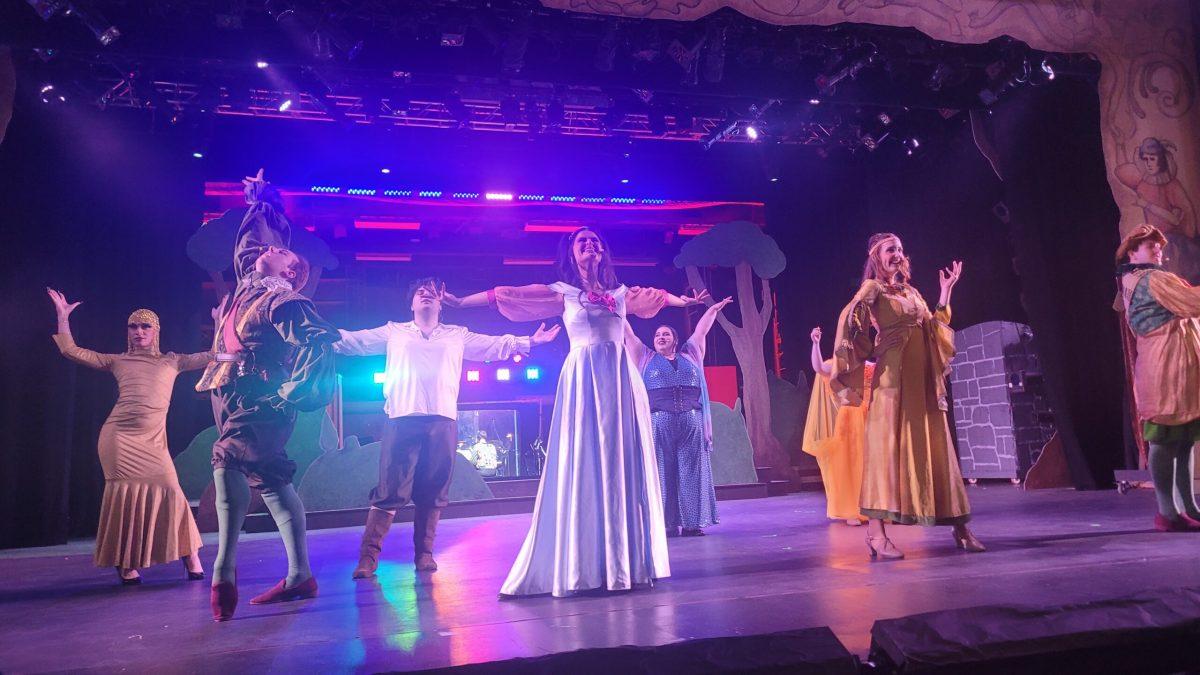Last weekend, the Department of Theatre & Dance performed a rendition of the musical “Head Over Heels.” Christopher Roche, an associate professor in the Department of Theatre and Dance, directed the production, which had a cast and crew full of extraordinary talent and told a motivational and entertaining storyline.
The musical comedy “Head Over Heels” includes a variety of well-known songs by the renowned rock group The Go-Go’s. The plot, which is set in the Elizabethan era, centers on a royal family’s exploration and acceptance of their own identity. Mistaken identities, romantic entanglements, and comic escapades abound throughout the story.
This production’s emphasis on and celebration of queer identities, which are uncommon in traditional mainstream musicals, was its most notable aspect. Pythio was a non-binary character who was brought to life with great depth and authenticity by Xavier Rivera, a junior theatre major with concentrations in musical theatre and pre-teaching. This was Rivera’s fourth mainstage performance, and the crowd praised their nuanced and powerful portrayal of Pythio.
“I do like the diverse characters, you know? I think we need more theater plays with gender diversity, not just male and female but instead across the gender spectrum as well,” said Jessica Kantor, who was one of the audience members who also had a relative part of the production team.
Musidorus, who came out as queer near the play’s conclusion, was another important queer character. To be near Philoclea, the woman he is in love with, Musidorus disguises himself as an Amazonian woman named Cleophila. Musidorus discovers later in the narrative that he prefers to sometimes assume the identity of Cleophila and longs to dress up as her whenever possible, raising the possibility that he is gender-fluid. This on-stage depiction of gender-fluidity represents a substantial improvement in the portrayal of various gender identities in theater.
The role of Pamela, Philoclea’s older sister, also featured a queer identity. Pamela is persistently courted by bachelors throughout the narrative, but she rejects each one of them. As the story progresses, Pamela starts to wonder what she wants in a spouse and eventually comes to the conclusion that she is in love with her devoted handmaid, Mospa. The two characters fall in love, making this dynamic another portrayal of queer love.
“I just think the show is so much about love, love and its many different forms, and how it exists in so many different forms. And just being tolerant and learning that the world is changing, and we should change and love each other instead of being hateful and judgmental. Life is about having fun and dancing in moments where it’s stressful,” said Hannah O’Brien who portrayed Pamela in the play. She is a senior theater major with a concentration in musical theater. “Head Over Heels” is her first full musical.
In addition to depicting LGBT identities, “Head Over Heels” also touched on significant topics of female empowerment, particularly in leadership positions. The kingdom’s ruler, Basilius, transfers power to his wife more competent wife, Gynecia. It sends a strong message about gender equality and empowerment since it questions conventional gender stereotypes and emphasizes the ability of women in leadership roles.
The acting in “Head Over Heels” was nothing less than extraordinary. The actors delivered remarkable, fiery performances that brought the narrative to life. With a contemporary touch, the outfits captured the aesthetics of the Elizabethan age. The production was made even more entertaining by the vibrant and captivating choreography. The singing was intense and moving, capturing the essence of The Go-Go’s songs and giving them new significance in the context of the narrative.
For his outstanding work on “Head Over Heels,” director Christopher Roche— who is also the department’s coordinator of the musical theater track— deserves special praise. In a way that was both thought-provoking and amusing, Roche’s concept for the production pushed limits and confronted various societal norms.
“I tell this story because even in moments of crisis, there is always the need for a laugh. ‘Head Over Heels’ is an opportunity to laugh and cry in a time of crisis. I proposed ‘Head Over Heels’ because it is cautionary and celebratory,” said Roche. “‘Head Over Heels’ celebrates being queer. I celebrate being queer. This jukebox musical is an opportunity to think, giggle, and hope.”
“Head Over Heels” acted as a beacon of acceptance, displaying the beauty of LGBTQ identities and pushing conventions at a time when representation and inclusivity are more crucial than ever. The musical made a deep impression on audiences with its performances, story, and themes, encouraging them to embrace diversity and cherish love in all its manifestations. “Head Over Heels” was a huge success and a tribute to the power of the arts to inspire awareness, acceptance, and celebration of LGBT identities.
For questions/comments about this story email [email protected] or tweet @TheWhitOnline.

























































































































































!["Working with [Dr. Lynch] is always a learning experience for me. She is a treasure,” said Thomas. - Staff Writer / Kacie Scibilia](https://thewhitonline.com/wp-content/uploads/2025/04/choir-1-1200x694.jpg)











































